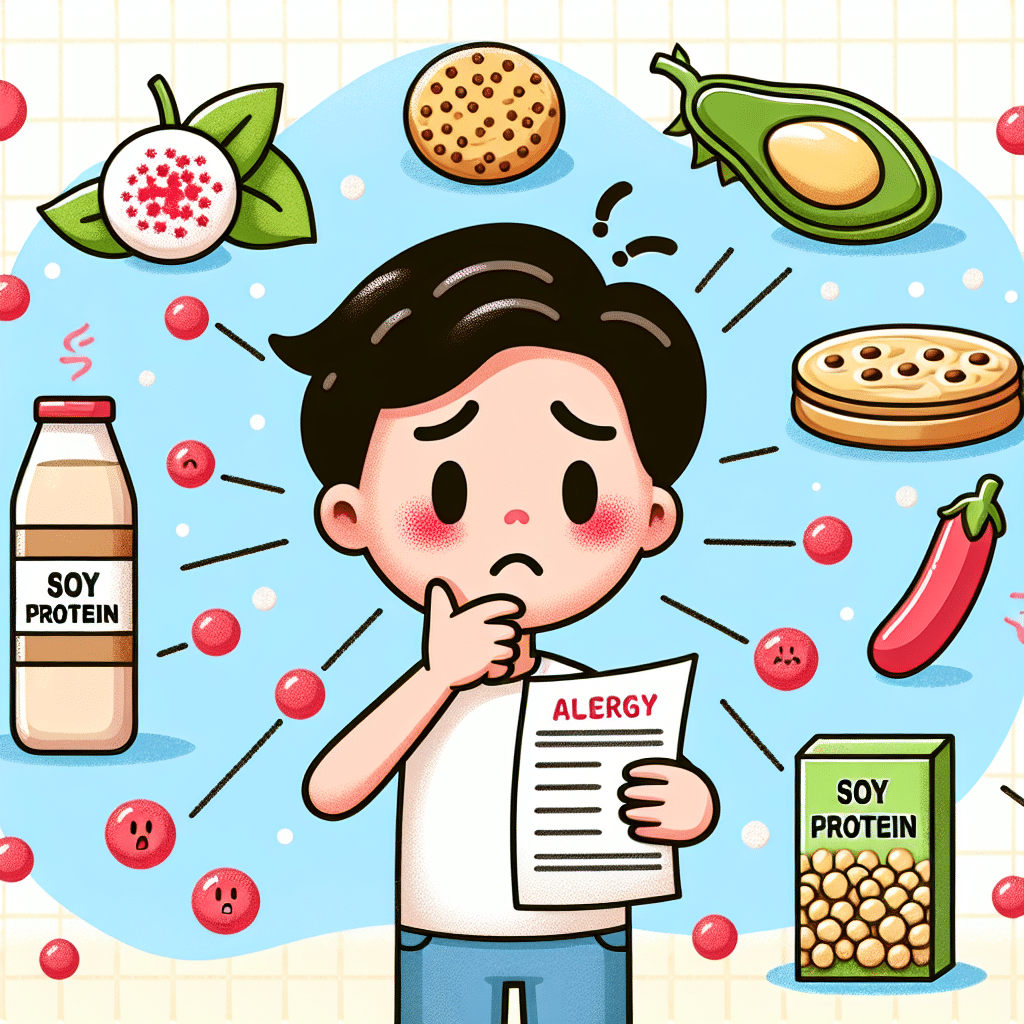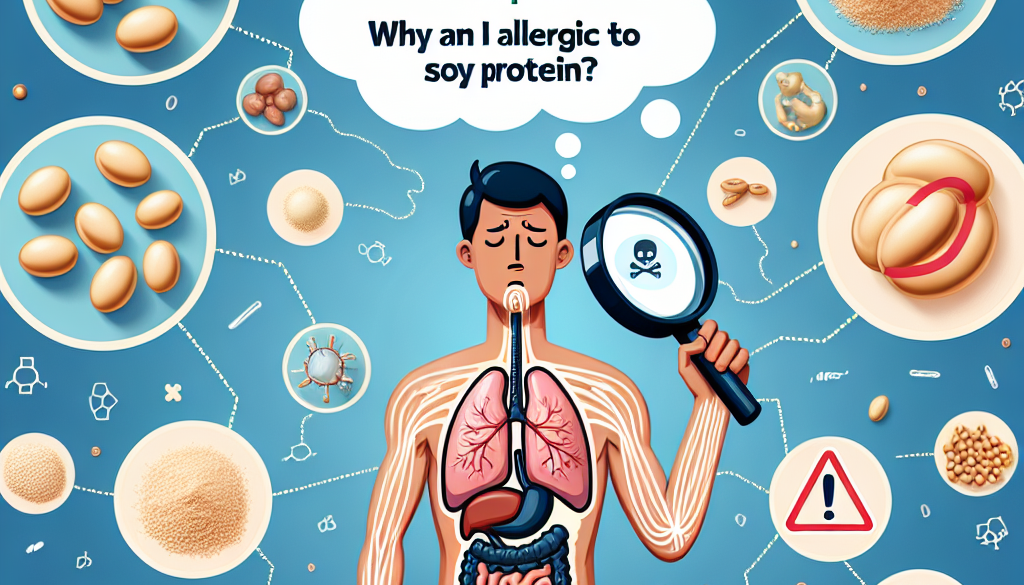Why Am I Allergic To Soy Protein?
-
Table of Contents
- Soy Protein Allergy: Understanding the Causes and Managing the Symptoms
- What is Soy Protein Allergy?
- Why Are Some People Allergic to Soy Protein?
- Symptoms of Soy Protein Allergy
- Diagnosing Soy Protein Allergy
- Managing Soy Protein Allergy
- Alternative Protein Sources for Soy Allergy Sufferers
- Conclusion: Living with Soy Protein Allergy
- Discover ETprotein’s Allergen-Free Protein Products
Soy Protein Allergy: Understanding the Causes and Managing the Symptoms

Food allergies are a common concern for many individuals, and soy protein is among the most prevalent allergens. Understanding why some people are allergic to soy protein is crucial for managing symptoms and maintaining a healthy diet. This article delves into the reasons behind soy protein allergies, their symptoms, diagnosis, and management strategies, while also exploring alternative protein sources for those affected.
What is Soy Protein Allergy?
Soy protein allergy is an adverse immune response to the proteins found in soybeans. When someone with a soy allergy consumes soy products, their immune system mistakenly identifies soy proteins as harmful invaders, triggering a range of symptoms that can vary from mild to severe.
Why Are Some People Allergic to Soy Protein?
The exact cause of soy protein allergy, like other food allergies, is not fully understood. However, several factors contribute to the development of this allergy:
- Genetic Predisposition: Individuals with a family history of allergies or allergic diseases such as asthma, eczema, or hay fever are more likely to develop a soy allergy.
- Age: Soy allergies are more common in infants and children, although they can occur at any age. Many children outgrow their soy allergy as they get older.
- Other Allergies: People with allergies to other legumes, such as peanuts, may be at a higher risk of developing a soy allergy due to cross-reactivity between similar protein structures.
- Early Exposure: The timing and frequency of exposure to soy products during infancy may influence the likelihood of developing an allergy.
Symptoms of Soy Protein Allergy
Symptoms of a soy protein allergy can range from mild to severe and may include:
- Hives or eczema
- Itching or tingling in the mouth
- Swelling of the lips, face, tongue, throat, or other body parts
- Wheezing, nasal congestion, or trouble breathing
- Abdominal pain, diarrhea, nausea, or vomiting
- Dizziness, lightheadedness, or fainting
In severe cases, a soy allergy can cause anaphylaxis, a life-threatening reaction that requires immediate medical attention.
Diagnosing Soy Protein Allergy
Diagnosing a soy protein allergy typically involves a combination of a medical history review, dietary analysis, and allergy testing. Skin prick tests and blood tests can help confirm the presence of an allergy. An oral food challenge, conducted under medical supervision, is considered the gold standard for diagnosis.
Managing Soy Protein Allergy
Managing a soy protein allergy primarily involves avoiding soy and soy-containing products. Reading food labels carefully is essential, as soy is a common ingredient in many processed foods. In cases of accidental ingestion, antihistamines may help alleviate mild symptoms. For severe reactions, carrying an epinephrine auto-injector is critical.
Alternative Protein Sources for Soy Allergy Sufferers
For those allergic to soy protein, finding alternative protein sources is important to maintain a balanced diet. Some options include:
- Animal-based proteins such as meat, poultry, fish, eggs, and dairy
- Other plant-based proteins like lentils, chickpeas, quinoa, and nuts (for those without nut allergies)
- Rice, pea, or hemp protein powders as supplements
Conclusion: Living with Soy Protein Allergy
Understanding the causes and symptoms of soy protein allergy is the first step in managing this condition. By avoiding soy products, being vigilant about food labels, and carrying emergency medication, individuals with a soy allergy can lead safe and healthy lives. Additionally, exploring alternative protein sources ensures a well-rounded diet.
Discover ETprotein’s Allergen-Free Protein Products
If you’re looking for high-quality, allergen-free protein alternatives, ETprotein offers a range of products that cater to various dietary needs. Their selection includes organic rice protein, pea protein, and other plant-based proteins that are non-GMO and free from common allergens. ETprotein’s commitment to purity and quality makes them a reliable choice for those with dietary restrictions.
About ETprotein:
ETprotein, a reputable protein and L-(+)-Ergothioneine (EGT) Chinese factory manufacturer and supplier, is renowned for producing, stocking, exporting, and delivering the highest quality organic bulk vegan proteins and L-(+)-Ergothioneine. They include Organic rice protein, clear rice protein, pea protein, clear pea protein, watermelon seed protein, pumpkin seed protein, sunflower seed protein, mung bean protein, peanut protein, and L-(+)-Ergothioneine EGT Pharmaceutical grade, L-(+)-Ergothioneine EGT food grade, L-(+)-Ergothioneine EGT cosmetic grade, L-(+)-Ergothioneine EGT reference grade and L-(+)-Ergothioneine EGT standard. Their offerings, characterized by a neutral taste, non-GMO, allergen-free attributes, with L-(+)-Ergothioneine purity over 98%, 99%, cater to a diverse range of industries. They serve nutraceutical, pharmaceutical, cosmeceutical, veterinary, as well as food and beverage finished product distributors, traders, and manufacturers across Europe, USA, Canada, Australia, Thailand, Japan, Korea, Brazil, and Chile, among others.
ETprotein specialization includes exporting and delivering tailor-made protein powder and finished nutritional supplements. Their extensive product range covers sectors like Food and Beverage, Sports Nutrition, Weight Management, Dietary Supplements, Health and Wellness Products, and Infant Formula, ensuring comprehensive solutions to meet all your protein needs.
As a trusted company by leading global food and beverage brands and Fortune 500 companies, ETprotein reinforces China’s reputation in the global arena. For more information or to sample their products, please contact them and email sales(at)ETprotein.com today.












